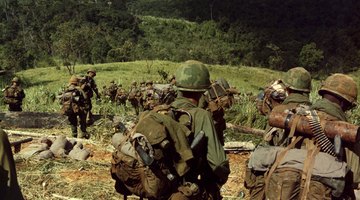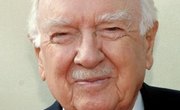"The Vietnam War was like a wound that would never heal." - Ed Sanders
United States involvement in the Vietnam War has always been debatable and controversial with many viewing the war as a still-gaping wound. Proponents and opponents have their own strong emotions about the conflict and after effects. Some believe U.S. intervention was critical to the suppression of Communism while also vital to prevent South Vietnam from coming under North Vietnamese rule. Those who opposed U.S. involvement in Vietnam have steadfast reasons for rejecting participation in the war. Opponents of American involvement in the war were against a war that resulted in a high number of American casualties at tremendous financial expense.
Not a U.S. Concern
Anti-involvement theorists argue that the U.S. shouldn’t have invaded Vietnam because Vietnam’s internal conflicts and political battles didn’t directly influence or affect America. Even though U.S. politicians, military experts and leaders of foreign affairs generally agreed that Communism violated democracy and infringed on political freedoms, conflicts in Vietnam posed no direct threat to the U.S. government or to the freedoms Americans enjoyed. Some believe American invasion of North Vietnam was a form of bullying. By looking at the envision as a war move designed to make the U.S. appear as the dominant world power, they note America had nothing to gain from engaging in the conflicts that were viewed as being Vietnam's own civil war.
Cost of War
The cost of the Vietnam War was astronomical. Economists report the Vietnam War cost the U.S. $111 billion during war time, which calculates to $738 billion by 2011 standards, according to the Congressional Research Service. World War II and the 2003-2010 wars in Iraq were the only U.S. conflicts that were more costly than the Vietnam War. When that much money is spent on foreign interests, it increases America’s debt and leaves fewer resources for programs and interests at home. Some argue that the cost should have inhibited the U.S. from getting involved.
Casualties
Vietnam War-related American deaths totaled 90,220, including those who died on battlefields and those who died from other causes related to the war, according to the Department of Veterans Affairs. Some 47,434 soldiers died in battle. Only the American Civil War and World War II had more U.S. deaths than the Vietnam War. Some political theorists argue that the loss of life wasn’t worth the sacrifice, and soldiers weren't adequately prepared to face the enemy. U.S. soldiers fought on foreign soil in jungles, often engaging in hand-to-hand combat, and weren’t trained or equipped to handle those conditions. American soldiers were often ambushed by the Viet Cong and strategic North Vietnamese troops who knew how to maneuver in the jungles and use guerrilla tactics. U.S. troops weren't prepared to face this style of warfare.
Unwinnable Battle
The U.S. invaded Vietnam and engaged in a war that was unwinnable. Half a million U.S. troops and 700,000 South Vietnamese troops were no match for the 250,000 soldiers in North Vietnam, according to a 1968 speech by Robert F. Kennedy’s 1968. Even if the U.S. sent more troops to support the South Vietnamese, the South Vietnamese wouldn’t be able to protect or sustain their post-war military successes. Their lands had been ravaged by war, and they had few resources to rebuild their nation. Ultimately, the war left the nation in ruins.
National Conscience
The Vietnam War didn’t just result in the deaths of American and Vietnamese military personnel, including U.S. soldiers who were drafted by the U.S. government. Many innocent Vietnamese, Laotian, Hmong and Cambodian civilians, including women and children, were victims of the bloody battles, bombings and raids as well. Military strategists and politicians, such as Robert Kennedy, stated that the invasion of Vietnam and continued U.S. support would only lead to the extended slaughter of civilians -- a weight on American’s conscience that couldn’t be ignored or overlooked. Involving itself in a war that contradicted its national conscience took the compass of the U.S. off track during the war.
Related Articles
References
Writer Bio
As curriculum developer and educator, Kristine Tucker has enjoyed the plethora of English assignments she's read (and graded!) over the years. Her experiences as vice-president of an energy consulting firm have given her the opportunity to explore business writing and HR. Tucker has a BA and holds Ohio teaching credentials.











